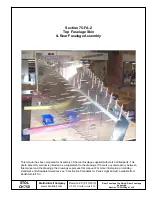
4
ElectraGlide Instruction Manual
LITHIUM POLYMER FLIGHT BATTERY
The Lithium polymer (Li-po) fl ight battery is a high power battery designed to give a fl ight time of up to 10 minutes per charge. It is
supplied in a partially charged state.
As well as a red T-Plug power lead, the battery is also fi tted with a white 3-pin polarised connector. This is the charge lead.
When you have fi nished fl ying for the day, recharge the battery and always leave it in a partially or fully charged state. Never leave
your battery in a discharged state as this may damage the battery and shorten it’s life.
If you notice the ElectraGlider is losing power, land and recharge the battery.
Do not be tempted to run the battery past this stage as you will be over-discharging and the battery may be damaged.
WARNING!
We recommend that you use only the supplied charger with this battery.
WARNING!
Over-discharging will shorten the life of the battery or damage it.
WARNING!
Do not short circuit—battery may explode!
PLEASE READ THE SAFETY PROCEDURES FOR HANDLING LI-POLY BATTERIES BELOW BEFORE PROCEEDING FURTHER.
LITHIUM POLYMER BATTERY SAFETY
Before Charging Li-po’s
■
Before charging your battery check for any damage e.g. check if the battery has expanded or swollen in size or if the battery
cells have been punctured. If any of the above is true: DO NOT CHARGE THE BATTERY!
Charging Li-po’s
■
Only use a charger designed to charge Lithium polymer batteries. Never use a nicad or other charger as this is very dangerous.
■
Never attempt to charge at a rate faster than that recommended in the instructions. Check that the
battery
cell count matches
the
charger
cell count switch (if fi tted).
■
Never charge unattended. Always stay with your battery whilst charging in case of overheating or fi re.
■
Charge on a safe surface or container (e.g. old unused microwave oven). Charge
only
on non-fl ammable surfaces, e.g. concrete
fl oor preferably outdoors, or in a pyrex cooking dish with the battery placed on a bed of sand, or in a fi replace. Never charge
inside a car!
■
Switch off charger if battery gets too hot. If the battery becomes hot to the touch during charging, disconnect and switch off
immediately.
■
Extinguish fi res with sand. If something goes wrong and your battery catches fi re, always have sand from a fi re bucket at hand
to douse the fl ames. Do NOT use water!
Using Li-po’s
■
Do not modify/change any part of the battery or lead. Do not remove its heat shrink protective covering. Removal or modifi ca-
tion may damage the battery and will invalidate any warranty claim.
■
Do not place this battery near fi res or anything with high temperatures.
■
Do not charge batteries while you are driving and do not store batteries in any type of motor vehicle.
■
Do not let the battery get wet or become submerged in any type of liquid.
■
Do not carry loose batteries in your pocket or bag as they could short-circuit against other items.
■
If you should get electrolyte from the cells on your skin, wash thoroughly with soap and water. If in your eyes, rinse thoroughly
with water. Seek medical assistance.



























